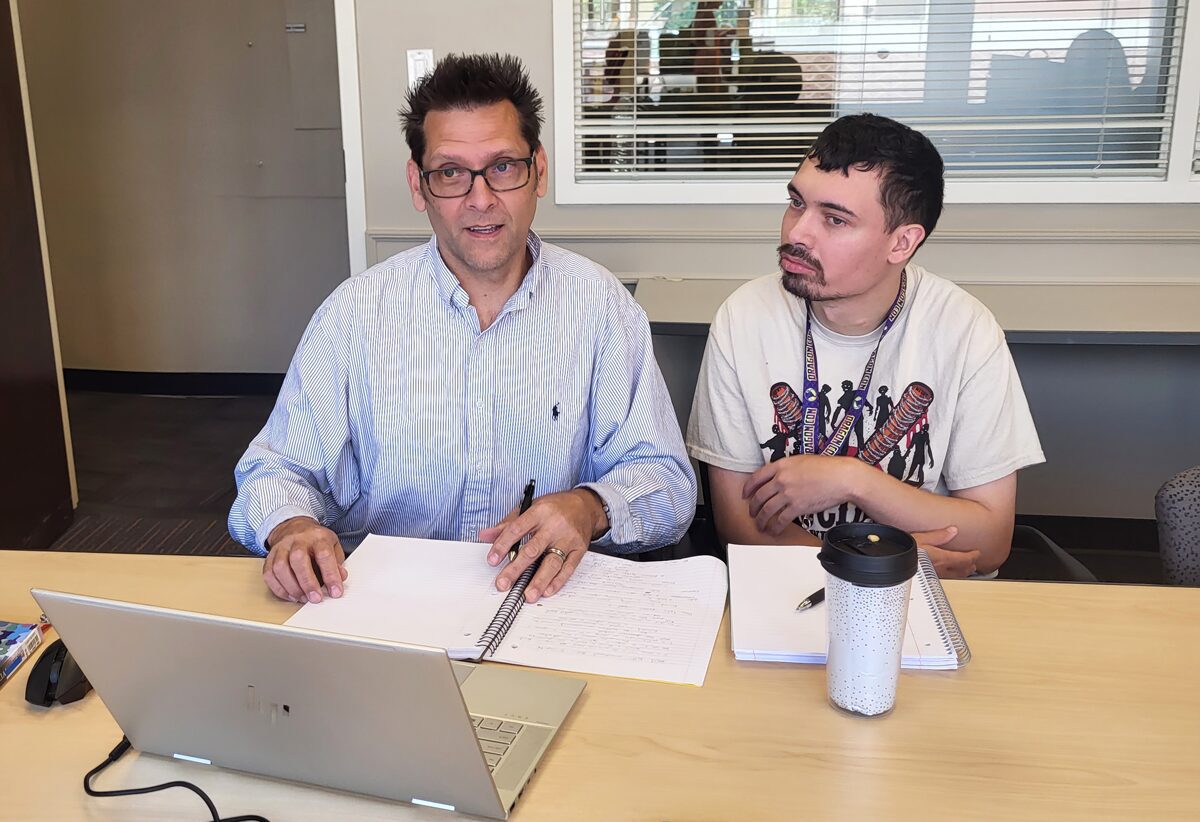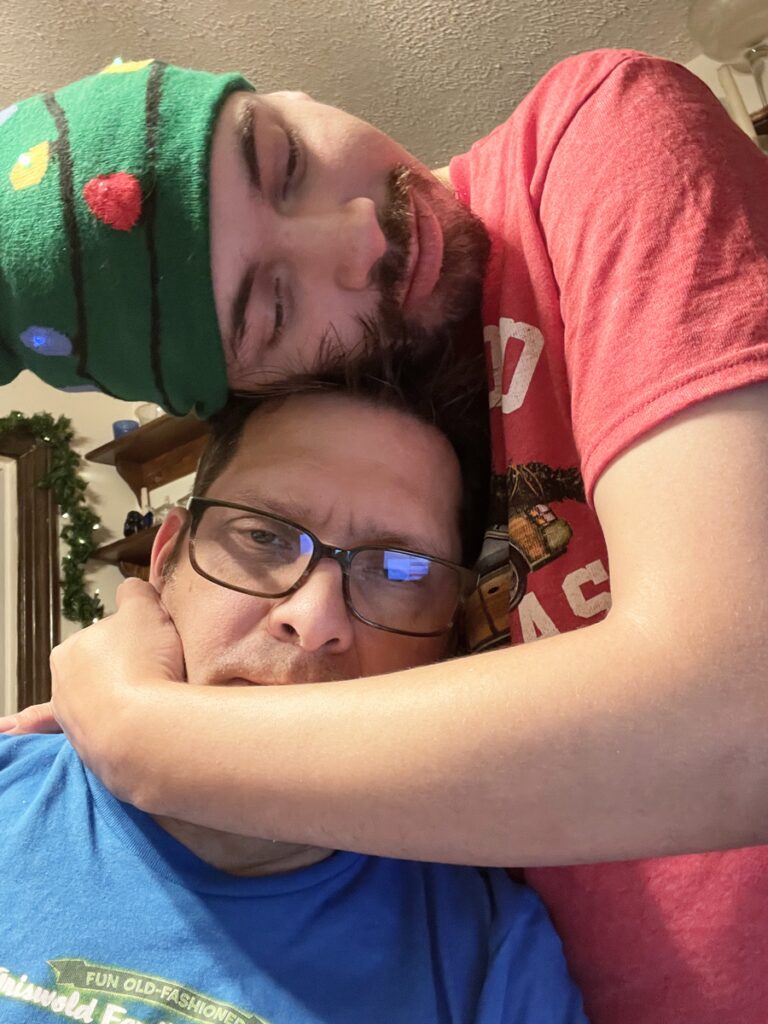PhD Student Finds the Magic in Communication Studies

From left: Curt and Ty Anderson
When the COVID-19 pandemic hit, Curt Anderson’s career as a professional magician came to an abrupt stop. It was time for him to pull a new kind of trick out of his hat, and a suggestion from a professor at the University of Alabama encouraging Anderson to finish his undergraduate degree ended up being nothing short of magic.
So, while the stages were shut down, Anderson picked up where he’d left off more than 30 years before and earned his bachelor’s degree. Now, Anderson just started his first semester in the doctoral program at the College of Communication and Information, where he is focusing his research in communication studies.
Making Magic
As a junior in college, Anderson had intended to put his college education on pause just for a semester to pursue opportunities in performing magic. But the opportunities kept coming, and eventually magic became a full-time career that took him all over the country.
“I did my first magic trick at 7, my first paid show at 11, and on the road as an apprentice every weekend by the time I was 13 and I had my own magic business before I was 17. I put myself through school the first time doing magic shows,” he said.
While he may not have finished college on the first go, Anderson has approached magic with critical thinking and analysis that now forms the basis of his research expertise. That’s how he met Darrin Griffin, associate professor and chair of communication studies at the University of Alabama; Anderson was a guest speaker once or twice a semester for the “Truth, Ethics, and Deception” course taught there, and Griffin saw the magician’s ability to apply his knowledge to the field of communication studies. Griffin viewed Anderson’s potential to not just impact research with his unique perspective, but also realized in him a unique talent to hold an audience’s attention and help them understand subject matter—he didn’t want Anderson to stop at getting an undergraduate degree, he wanted him to teach.
The effects of the pandemic on his career pushed Anderson to think beyond magic, and Griffith’s suggestion provided a potential solution to both immediate and long-term issues that working in entertainment posed.
“At my age, I had really already started thinking about, where is the end road of this? What if I get to the point where I can’t do shows any more? At 70, I probably can’t climb in and out of boxes in a way that looks entertaining on stage,” he said.
After getting a full scholarship to finish his bachelor’s degree, Anderson was then offered a fully funded opportunity to earn his master’s in communication studies at the University of Alabama, Birmingham (UAB). There, he worked with Timothy Levine, distinguished professor and chair of communication studies, and a scholar who studies deception in communication and who formulated the truth-default theory.

A depiction of Curt Anderson performing a magic trick.
A Study of Deception
Deception was the impetus for the scientific study of communication. While some may trace communication studies back to the oral traditions of Plato, Aristotle, and Socrates, studying communication in a measurable, scientific way didn’t arise until after World War II.
“Communication studies as an actual field, it’s still a young science. You couldn’t go get a degree in communication studies in the early 1900s, because we just thought about it as people talking,” Anderson said. “But then Hitler comes along and we thought, ‘Hey, that wasn’t good. We should study how that happens.’ And that was a big influence on how communication studies became a viable field.”
As this relatively new field continues to grow, the research and theories behind it also are evolving, just as in any scientific study. For example, deception was once thought of as always inherently bad or malevolent. As researchers continued studying it, it became apparent that deception is often used in benevolent ways, said School of Communication Studies Associate Professor Mike Kotowski, who is also Anderson’s advisor. Kotowski gave examples such as using deception to spare someone’s feelings or to plan a surprise, and of course there’s also magic, which is the use of deception to delight and entertain an audience.
That’s where Anderson’s two areas of expertise, deception in magic and communication studies, intersect, and where Kotowski said the doctoral student will be able to provide a certain nuance around deception and the role it plays in social influence—the latter of which is Kotowski’s area of research.
Where it gets interesting is how deception in magic seems to work much differently than it does in everyday interactions, Anderson said. He uses Judy Burgoon’s well-established and replicated interpersonal deception theory as an example. One of the tenets of that theory is, the more you interact with people who deceive you, the easier it is to spot that deception, and the metadata consistently shows that 54 percent of the time someone can tell they are being deceived.
“In a magic show, the longer a show goes, the more interaction you have with the people you’re deceiving and the better they get to know you and they have experience to know you from the first deception of the show to the last deception of the show. But if 54 percent of the audience figured out how the tricks were done, we’d all be out of business. It’s obvious when you point it out: magicians fool people and exposure over time doesn’t help the audience understand how the tricks are done,” he said.
In the research Anderson has conducted during his master’s program with Levine, he spoke to magicians from around the world to learn more about what they think about deception in magic. While most research often yields uniform answers among a group of people when they’re individually asked a basic question, Anderson discovered that answers to the question, “Do you believe magic is deception?” resulted in many disparate answers. So there’s a lot more to explore in this area, he said.
“My ideal place in this world is to get to understand the method of science as far as it’s related to deception and to take the knowledge and experience of myself and other great magicians to understand it through academia. We haven’t had the resources to tap into professional magicians in the way that I can,” he said.
Anderson believes the results could help both magicians and everyday people; the former could get tips on how to get better at deception, and the latter would get tools to help protect them from malevolent deceivers such as con artists and scammers.
“Curt’s asking really important and exciting questions about how, when, why, and where deception happens. His research program adds incredible nuance to our understanding of how humans deceive, and the meaning deception has for us when we’re on the receiving end of it and when we engage in it,” Kotowski said. “I’m excited he’s identified me as a great fit because, with my expertise in social influence, I’ll be able to help him out and contribute to his scholarly development.”
A Non-Traditional Student
Nothing about Anderson fits any stereotypical mold of a graduate student. From his 30-year academic hiatus to his unique research perspective inspired by a lifelong career as a magician, he bucks any expected trends. But one of the more noticeable differences is that Anderson also doesn’t go anywhere without his adult son, Ty.
Ty Anderson has a degenerative and very severe form of epilepsy that has caused him to have more than 14,000 tonic-clonic (grand mal) seizures over his lifetime. These seizures have taken away most of his ability to learn and have also diminished his capacity to speak, to the point where he is now mostly non-verbal. Anderson is his son’s main caregiver and ever since Ty has needed him, Anderson has ensured he would be there.

“When I did shows, I had a rider that he’d be coming with me. If I was doing stand-up comedy or inspirational speaking, potentially I’d have to have someone from the venue sit with him at the show in case he had a seizure. In my return to academia, both undergrad and master’s, he’s been with me in every class I take, every class I teach, and everything I do,” he said.
UAB was welcoming to Ty and made sure Anderson could have his son with him at all times, and he said that the University of Tennessee, Knoxville, has likewise been happy to accommodate the pair.
“There’s no reason you can’t learn at the highest level if he’s with you, as long as he’s not a major distraction. He doesn’t understand the world the same way we do and may have reactions that are different. I make sure the other students are aware it may happen and if it gets too distracting, I step out with him,” Anderson said. “Everybody, I mean everybody on this path, has been really supportive. No one has ever complained about Ty being there.”
PhD Student Finds the Magic in Communication Studies written by Hillary Tune and originally published on the College of Communication & Information site.